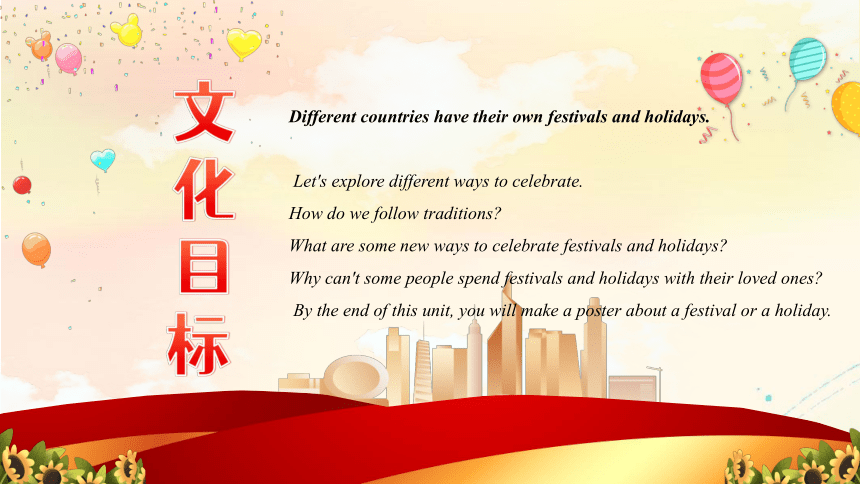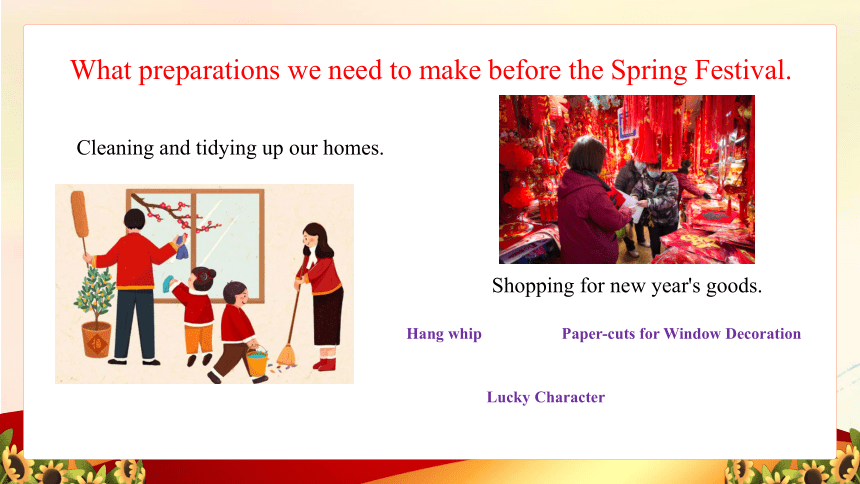外研版(2024)七年级上册Unit 4 Time to celebrate-Starting out Understanding Ideas课件(共28张PPT)
文档属性
| 名称 | 外研版(2024)七年级上册Unit 4 Time to celebrate-Starting out Understanding Ideas课件(共28张PPT) |  | |
| 格式 | pptx | ||
| 文件大小 | 34.9MB | ||
| 资源类型 | 教案 | ||
| 版本资源 | 外研版 | ||
| 科目 | 英语 | ||
| 更新时间 | 2024-11-11 15:36:39 | ||
图片预览









文档简介
(共28张PPT)
Unit 4 Time to Celebrate
Starting out
Understanding ideas
文化目标
Different countries have their own festivals and holidays.
Let's explore different ways to celebrate.
How do we follow traditions
What are some new ways to celebrate festivals and holidays
Why can't some people spend festivals and holidays with their loved ones
By the end of this unit, you will make a poster about a festival or a holiday.
语言目标
use words and expressions in the unit to talk about festivals and holidays.
use adverbs of frequency and the simple present tense to talk about ways to celebrate festivals and holidays.
introduce different festivals and holidays as well as their culture
Warm-up
Mid-autumn Day
National Day
the Lantern Festival?
the Spring Festival?
What preparations we need to make before the Spring Festival.
Cleaning and tidying up our homes.
Shopping for new year's goods.
Hang whip
Paper-cuts for Window Decoration
Lucky Character
What preparations we need to make before the Spring Festival.
On the Laba Festival, people drink Laba porridge.
On the 23rd of the twelfth lunar month, people offer sacrifices to the Kitchen God.
On the 24th of the twelfth lunar month, people clean and dust their houses.
On the 25th of the twelfth lunar month, people grind beans to make tofu.
On the 26th of the twelfth lunar month, people slaughter pigs and cut meat.
On the 28th of the twelfth lunar month, people make cakes, steam buns and paste paper-cuts.
On the 29th of the twelfth lunar month, people go to the graves to offer sacrifices to ancestors, paste door gods, paste Spring Festival couplets and stay up late to see the new year in.
Starting out
Look at the pictures and answer the questions.
1 What are the festivals in the pictures
2 What do you know about these festivals
1 What other festivals or holidays around the world do you know
2 Which one do you think is the most special Why
Understanding Ideas
Look at the picture on the right and answer the questions. Use the words and expressions to help you.
1 What are the people doing
2 What is on the table
Spring Festival
dish
dinner
family reunion
The people are having a family reunion or a dinner together.
On the table there is a Spring Festival dish, plates, cups, and possibly some other dining essentials like cutlery.
An unusual
1 It was my first Spring Festival in the UK. I wanted to treat my British friend, Emilia, to a Chinese dinner. She is a nice girl. Sometimes, she cooks for me.
2 However, I just couldn't make it. I often watched Grandma cook, but I never cooked anything myself. It was midnight in China, time for dumplings. But my whole family came to my help on the phone. And I became a chef in one hour! I even made some cucumber flowers.
An unusual
3 After Emilia hung balloons and lanterns in the
dining room, I put the last dish on the table. "This is the lion's head!"
"Are you joking Isn't that against the law " Emilia was shocked.
I laughed. "It's a pork meatball. My family always have it at the Spring Festival. Its round shape stands for family reunions. Try it!"
Emilia cut a piece of it with her knife and put it into her mouth. "I love it!" she said. The smell of the dishes and our laughter filled the room. I felt like I was back home.
Choose the writer's words after the meal.
a. I don't like having the Spring Festival all by myself.
b. I miss my family so much.
c.It's really an unusual but happy Spring Festival.
The writer’s problem
The writer’s solution
The result
It was my first______________in the UK. I wanted to cook a _______________for Emilia.
But I couldn’t do it.
At_________in China, my____________gave me help on the phone.
And I became a chef in an hour.
At________in China, my________ gave me help on the phone.
And I became a chef in an hour.
Sping Festival
Chinese dinner
midnight
whole family
dish
shocked
What is unusual about the writer’s Spring Festival
What is your family’s traditional dish for the Spring Festival Can you cook it
Think and share
Learning to think for question 1 What’s the common way of celebrating the
Spring Festival
How did the writer celebrate the Spring Festival
Read the sentences from the reading passage and summarise the grammar rules.
(a) Sometimes, she cooks for me.
(b) I often watched Grandma cook, but I never cooked anything myself.
(c) My family always have it at the Spring Festival.
当主语是第三人称单数(he, she, it)时,谓语动词需要加-s或-es。
"sometimes"是一个副词,表示频率,用于一般现在时。
"often"和"never"都是频率副词,但"often"用于肯定句,而"never"用于否定句。
"watched"和"cooked"都是过去式动词,用于描述过去发生的动作。
当主语是复数时,谓语动词使用原形。
"always"是一个频率副词,用于一般现在时,表示总是如此。
0%
100%
never
_1_________
3__________
2_________
My parents always stay up during the Spring Festival.
sometimes
often
always
Complete the diagram with the words in the box. Then make a sentence with each word.
Hi there! Welcome to my blog about Chinese culture! Today, let’s get to know the Dragon Boat Festival! ______ , people call it the Double Fifth Festival in English, because it______ takes place on the fifth day of the fifth lunar month.
The best part of the festival is the dragon boat races. The riversides are ______full of people.
Eating zongzi is a must during the festival. Zongzi in the north of China are_______sweet. But those in the south are_______salty. I________tried a salty one, so this year I’ll be sure to try some! Which taste do you prefer
Complete the blog post with always, often, sometimes, or never.
Often
always
always
often
often
sometime
Often
对于“people call it the Double Fifth Festival in English”(人们用英语称它为双五节),“often”表示这种情况比较常见,但不是绝对的。因为在英语中,虽然“Dragon Boat Festival”(端午节)也经常被称为“Double Fifth Festival”(双五节),但不是所有人都这么称呼,所以用“often”比较合适。
Always
“it always takes place on the fifth day of the fifth lunar month”(它总是在农历五月初五),端午节固定在农历五月初五,这是一个确定的日期,所以用“always”表示总是、一直。
Always
“The riversides are always full of people”(河岸总是挤满了人),在端午节期间,龙舟赛是非常盛大的活动,河岸通常总是(always)挤满了观看比赛的人,这里强调一种普遍的状态。
Often
“Zongzi in the north of China are often sweet”(中国北方的粽子常常是甜的),说北方粽子的口味,用“often”表示通常、大多数情况下是甜的,但不是绝对的,因为也可能有其他口味的粽子存在。
Often
“But those in the south are often salty”(但是南方的粽子常常是咸的),同理,南方粽子大多是咸的,但也不是完全没有其他口味,所以用“often”。
Sometimes
“I sometimes tried a salty one”(我有时候尝过咸的粽子),这里表示过去有过偶尔(sometimes)尝试咸粽子的经历,不是经常也不是从未,只是偶尔有这样的经历。
Work in pairs. Talk about your ways to celebrate a traditional festival. Use the thinking map to organise your ideas. Use the words and expressions from the reading passage and the Useful expressions to help you.
Who do you celebrate it with
What activities do you do
What food do you have
How do you feel
What festival is it
Useful expressions
How do you usually celebrate...
I often... But I never...
Sometimes I...
My family always... for...
My favourite activities include...
... is a must for...
How do you usually celebrate...
I often celebrate by gathering with my family and preparing a large meal together. We always include traditional dishes that have been passed down through generations.
Useful expressions
Sometimes I...
Sometimes I attend local festivals or fairs to experience different cultural traditions and try various traditional foods.
I often... But I never...
I often decorate our home with festive decorations and lights, but I never participate in any of the outdoor activities or parades.
Useful expressions
My favourite activities include...
My favorite activities include playing traditional games with my cousins and watching fireworks at night.
My family always... for...
My family always sets up a prayer altar and offers prayers for good health and prosperity during the festival.
is a must for...
A big feast with all the traditional dishes is a must for us during the celebration. It brings everyone together and creates a sense of unity.
Unit 4 Time to Celebrate
Starting out
Understanding ideas
文化目标
Different countries have their own festivals and holidays.
Let's explore different ways to celebrate.
How do we follow traditions
What are some new ways to celebrate festivals and holidays
Why can't some people spend festivals and holidays with their loved ones
By the end of this unit, you will make a poster about a festival or a holiday.
语言目标
use words and expressions in the unit to talk about festivals and holidays.
use adverbs of frequency and the simple present tense to talk about ways to celebrate festivals and holidays.
introduce different festivals and holidays as well as their culture
Warm-up
Mid-autumn Day
National Day
the Lantern Festival?
the Spring Festival?
What preparations we need to make before the Spring Festival.
Cleaning and tidying up our homes.
Shopping for new year's goods.
Hang whip
Paper-cuts for Window Decoration
Lucky Character
What preparations we need to make before the Spring Festival.
On the Laba Festival, people drink Laba porridge.
On the 23rd of the twelfth lunar month, people offer sacrifices to the Kitchen God.
On the 24th of the twelfth lunar month, people clean and dust their houses.
On the 25th of the twelfth lunar month, people grind beans to make tofu.
On the 26th of the twelfth lunar month, people slaughter pigs and cut meat.
On the 28th of the twelfth lunar month, people make cakes, steam buns and paste paper-cuts.
On the 29th of the twelfth lunar month, people go to the graves to offer sacrifices to ancestors, paste door gods, paste Spring Festival couplets and stay up late to see the new year in.
Starting out
Look at the pictures and answer the questions.
1 What are the festivals in the pictures
2 What do you know about these festivals
1 What other festivals or holidays around the world do you know
2 Which one do you think is the most special Why
Understanding Ideas
Look at the picture on the right and answer the questions. Use the words and expressions to help you.
1 What are the people doing
2 What is on the table
Spring Festival
dish
dinner
family reunion
The people are having a family reunion or a dinner together.
On the table there is a Spring Festival dish, plates, cups, and possibly some other dining essentials like cutlery.
An unusual
1 It was my first Spring Festival in the UK. I wanted to treat my British friend, Emilia, to a Chinese dinner. She is a nice girl. Sometimes, she cooks for me.
2 However, I just couldn't make it. I often watched Grandma cook, but I never cooked anything myself. It was midnight in China, time for dumplings. But my whole family came to my help on the phone. And I became a chef in one hour! I even made some cucumber flowers.
An unusual
3 After Emilia hung balloons and lanterns in the
dining room, I put the last dish on the table. "This is the lion's head!"
"Are you joking Isn't that against the law " Emilia was shocked.
I laughed. "It's a pork meatball. My family always have it at the Spring Festival. Its round shape stands for family reunions. Try it!"
Emilia cut a piece of it with her knife and put it into her mouth. "I love it!" she said. The smell of the dishes and our laughter filled the room. I felt like I was back home.
Choose the writer's words after the meal.
a. I don't like having the Spring Festival all by myself.
b. I miss my family so much.
c.It's really an unusual but happy Spring Festival.
The writer’s problem
The writer’s solution
The result
It was my first______________in the UK. I wanted to cook a _______________for Emilia.
But I couldn’t do it.
At_________in China, my____________gave me help on the phone.
And I became a chef in an hour.
At________in China, my________ gave me help on the phone.
And I became a chef in an hour.
Sping Festival
Chinese dinner
midnight
whole family
dish
shocked
What is unusual about the writer’s Spring Festival
What is your family’s traditional dish for the Spring Festival Can you cook it
Think and share
Learning to think for question 1 What’s the common way of celebrating the
Spring Festival
How did the writer celebrate the Spring Festival
Read the sentences from the reading passage and summarise the grammar rules.
(a) Sometimes, she cooks for me.
(b) I often watched Grandma cook, but I never cooked anything myself.
(c) My family always have it at the Spring Festival.
当主语是第三人称单数(he, she, it)时,谓语动词需要加-s或-es。
"sometimes"是一个副词,表示频率,用于一般现在时。
"often"和"never"都是频率副词,但"often"用于肯定句,而"never"用于否定句。
"watched"和"cooked"都是过去式动词,用于描述过去发生的动作。
当主语是复数时,谓语动词使用原形。
"always"是一个频率副词,用于一般现在时,表示总是如此。
0%
100%
never
_1_________
3__________
2_________
My parents always stay up during the Spring Festival.
sometimes
often
always
Complete the diagram with the words in the box. Then make a sentence with each word.
Hi there! Welcome to my blog about Chinese culture! Today, let’s get to know the Dragon Boat Festival! ______ , people call it the Double Fifth Festival in English, because it______ takes place on the fifth day of the fifth lunar month.
The best part of the festival is the dragon boat races. The riversides are ______full of people.
Eating zongzi is a must during the festival. Zongzi in the north of China are_______sweet. But those in the south are_______salty. I________tried a salty one, so this year I’ll be sure to try some! Which taste do you prefer
Complete the blog post with always, often, sometimes, or never.
Often
always
always
often
often
sometime
Often
对于“people call it the Double Fifth Festival in English”(人们用英语称它为双五节),“often”表示这种情况比较常见,但不是绝对的。因为在英语中,虽然“Dragon Boat Festival”(端午节)也经常被称为“Double Fifth Festival”(双五节),但不是所有人都这么称呼,所以用“often”比较合适。
Always
“it always takes place on the fifth day of the fifth lunar month”(它总是在农历五月初五),端午节固定在农历五月初五,这是一个确定的日期,所以用“always”表示总是、一直。
Always
“The riversides are always full of people”(河岸总是挤满了人),在端午节期间,龙舟赛是非常盛大的活动,河岸通常总是(always)挤满了观看比赛的人,这里强调一种普遍的状态。
Often
“Zongzi in the north of China are often sweet”(中国北方的粽子常常是甜的),说北方粽子的口味,用“often”表示通常、大多数情况下是甜的,但不是绝对的,因为也可能有其他口味的粽子存在。
Often
“But those in the south are often salty”(但是南方的粽子常常是咸的),同理,南方粽子大多是咸的,但也不是完全没有其他口味,所以用“often”。
Sometimes
“I sometimes tried a salty one”(我有时候尝过咸的粽子),这里表示过去有过偶尔(sometimes)尝试咸粽子的经历,不是经常也不是从未,只是偶尔有这样的经历。
Work in pairs. Talk about your ways to celebrate a traditional festival. Use the thinking map to organise your ideas. Use the words and expressions from the reading passage and the Useful expressions to help you.
Who do you celebrate it with
What activities do you do
What food do you have
How do you feel
What festival is it
Useful expressions
How do you usually celebrate...
I often... But I never...
Sometimes I...
My family always... for...
My favourite activities include...
... is a must for...
How do you usually celebrate...
I often celebrate by gathering with my family and preparing a large meal together. We always include traditional dishes that have been passed down through generations.
Useful expressions
Sometimes I...
Sometimes I attend local festivals or fairs to experience different cultural traditions and try various traditional foods.
I often... But I never...
I often decorate our home with festive decorations and lights, but I never participate in any of the outdoor activities or parades.
Useful expressions
My favourite activities include...
My favorite activities include playing traditional games with my cousins and watching fireworks at night.
My family always... for...
My family always sets up a prayer altar and offers prayers for good health and prosperity during the festival.
is a must for...
A big feast with all the traditional dishes is a must for us during the celebration. It brings everyone together and creates a sense of unity.
同课章节目录
